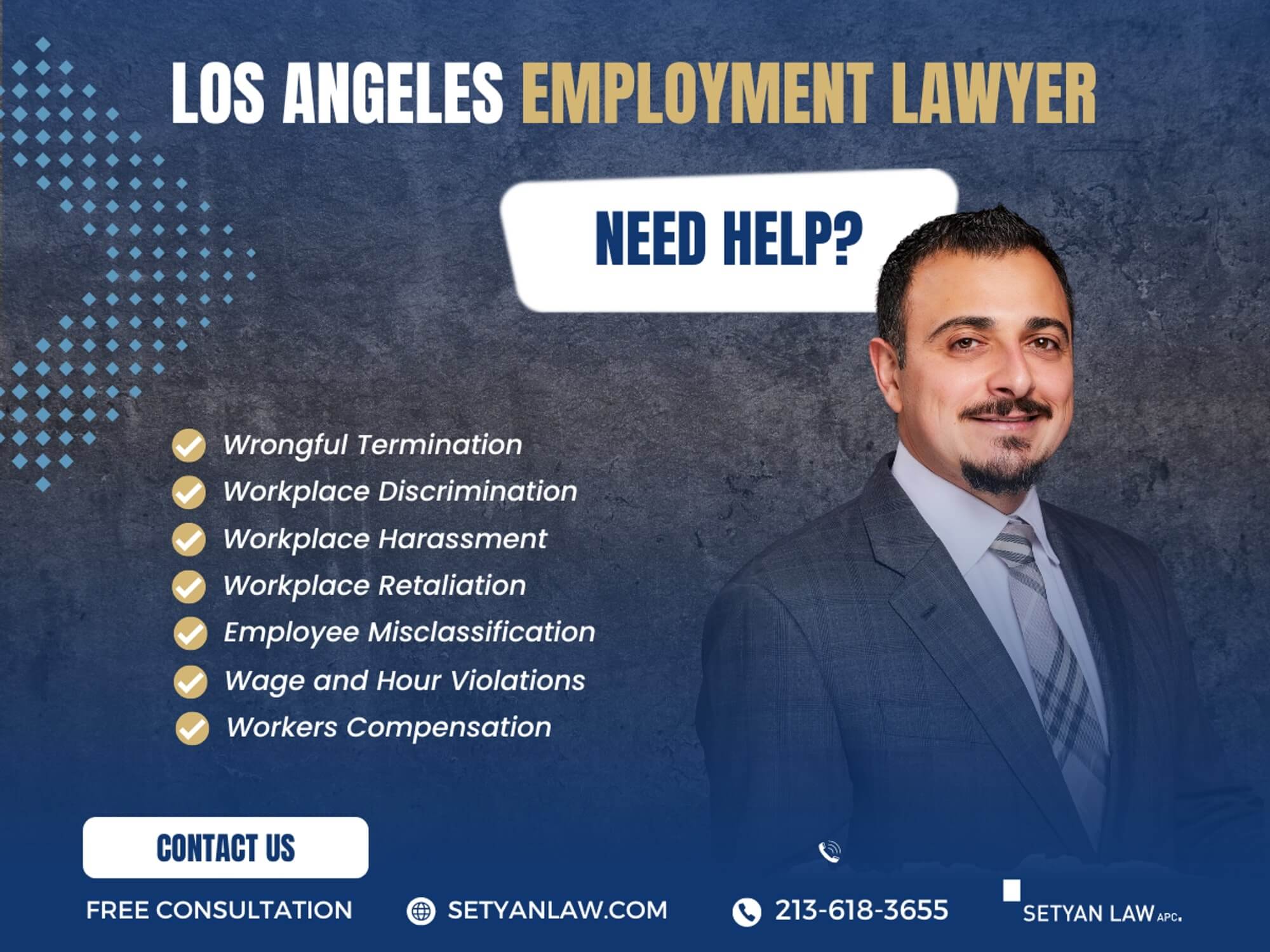Updated April 18, 2025
A Brief Overview of California Work Laws
The goal of this article is to touch on the most common protections involved with California employment law. Know that there are many more nuanced protections on our website that have separate articles. You can browse these articles here.
California’s labor laws are designed to protect the rights of employees while ensuring fair treatment in the workplace. These laws cover various aspects of employment, including wage regulations, break requirements, workplace safety, and employee rights during hiring and termination processes. Understanding these laws is essential for both employees and employers to foster a respectful and compliant work environment.
Employee Rights in California
Wage and Break Protections
All workers in California, regardless of their immigration status, are entitled to certain fundamental rights. These rights include:
- Minimum Wage: Employees must receive at least the state-mandated minimum wage, which varies based on the size of the employer and geographical location.
- Overtime Pay: Employees are entitled to overtime pay for hours worked beyond the standard 40 hours per week or 8 hours per day.
- Meal and Rest Breaks: California law mandates specific breaks for employees, ensuring they have time to rest and recuperate during their shifts.
Minimum Wage Regulations
Current Minimum Wage Rates
As of 2025, the minimum wage in California is set to increase based on the size of the employer:
| Employer Size | Minimum Wage (2025) |
|---|---|
| 25 or fewer employees | $16.50/hour |
| 26 or more employees | $16.50/hour |
Local Minimum Wage Variations
Many California cities have established their own minimum wage rates that exceed the state minimum. For example, cities like San Francisco and Los Angeles have higher minimum wage standards to reflect the cost of living in those areas. Employees should check local regulations to ensure they receive the appropriate wage.
Overtime Pay Requirements
Standard Overtime Rules
In California, non-exempt employees are entitled to overtime pay at the following rates:
- 1.5 times the regular rate for hours worked over 8 in a single day or over 40 in a week.
- 2 times the regular rate for hours worked over 12 in a day or for any hours worked on the seventh consecutive day of work.
Exceptions to Overtime Laws
Certain employees may be exempt from overtime regulations, including:
- Executive, administrative, and professional employees.
- Outside salespersons.
- Employees in specific industries, such as healthcare and transportation.
Employers must clearly communicate any exemptions to their employees to ensure compliance with labor laws.
Meal and Rest Break Requirements
Meal Breaks
California law mandates that employees who work more than five hours in a day are entitled to a 30-minute unpaid meal break. This break must be taken after no more than five hours of work. If an employee works more than ten hours, they are entitled to a second meal break.
Rest Breaks
In addition to meal breaks, employees are entitled to a 10-minute paid rest break for every four hours worked. These breaks should be taken as close to the middle of the work period as possible. Employers are required to provide a safe and accessible area for employees to take their breaks.
Workplace Safety Regulations
Employer Responsibilities
Employers are legally obligated to provide a safe working environment. This includes:
- Identifying and mitigating workplace hazards.
- Providing necessary safety equipment and training.
- Maintaining a written Injury and Illness Prevention Program (IIPP).
Reporting Unsafe Conditions
Employees have the right to report unsafe working conditions without fear of retaliation. If an employee believes their safety is at risk, they can contact Cal/OSHA, the California Division of Occupational Safety and Health, for an inspection.
Hiring and Termination Practices
Fair Hiring Practices
California law prohibits discrimination during the hiring process. Employers must ensure their hiring practices are fair and equitable, providing equal opportunities to all candidates regardless of their background.
Termination Rights
California is an "at-will" employment state, meaning employers can terminate employees for almost any reason. However, terminations cannot be based on discriminatory factors or in retaliation for asserting employee rights.
Final Paychecks
Upon termination, employers must provide final paychecks immediately if the employee has given at least 72 hours of notice. If the notice is less than 72 hours, the final paycheck must be provided within 72 hours of termination.
Employee Leave Rights
Family and Medical Leave
Under the Family and Medical Leave Act (FMLA) and California’s Family Rights Act (CFRA), eligible employees can take up to 12 weeks of unpaid leave for specific family and medical reasons, including:
- Birth or adoption of a child.
- Serious health conditions affecting the employee or a family member.
Sick Leave
California law requires employers to provide sick leave to employees who have worked for them for more than 30 days. Employees accrue sick leave at a rate of one hour for every 30 hours worked, which can be carried over from year to year.
Other Leave Types
California law also provides for various other types of leave, including:
- Jury duty leave: Employees must be allowed time off to serve on a jury, although this leave does not have to be paid.
- Voting leave: Employers must provide time off for employees to vote, typically up to two hours if requested in advance.
Protections Against Discrimination, Harassment and Retaliation
Protection Against Discrimination
California law prohibits discrimination in the workplace based on various factors, including race, gender, age, disability, and sexual orientation. Employees have the right to work in an environment free from harassment and retaliation. If an employee experiences discrimination, they can file a complaint with the California Department of Fair Employment and Housing (DFEH).
Protection Against Harassment
California law provides robust protections against harassment in both civil and employment contexts. Under the California Fair Employment and Housing Act (FEHA), it is unlawful for an employer to harass an employee or job applicant based on protected characteristics such as race, gender, religion, sexual orientation, or disability. Harassment can include verbal abuse, unwanted physical contact, or visual conduct that creates a hostile or offensive work environment.
Outside of employment, California Civil Code section 527.6 allows individuals who are being harassed to seek a civil harassment restraining order. This protection is available when someone has suffered harassment that is not related to a domestic relationship and includes behaviors like stalking, threats, or repeated unwanted contact.
Victims of harassment in California have legal avenues to seek protection, monetary damages, and court orders to stop the harassing behavior.
Protection Against Retaliation
California law strictly prohibits retaliation against individuals who assert their rights under state and federal laws. Under the California Fair Employment and Housing Act (FEHA) and Labor Code sections 98.6, 1102.5, and others, it is illegal for an employer to retaliate against an employee for engaging in protected activities—such as reporting discrimination, harassment, unsafe working conditions, or wage violations, or for participating in workplace investigations.
Retaliation can take many forms, including termination, demotion, reduction in hours, or other adverse actions meant to discourage the employee from asserting their rights. Victims of retaliation may be entitled to reinstatement, back pay, emotional distress damages, and even punitive damages in some cases.
California’s strong retaliation protections aim to ensure that workers can speak up without fear of punishment, fostering safer and fairer workplaces.
Protection Against ‘Wrongful Termination’
While California is an “at-will” employment state—meaning employers can generally terminate employees without cause—there are important exceptions that protect workers from wrongful termination. It is illegal for an employer to fire an employee for reasons that violate public policy, discriminate based on protected characteristics (like race, gender, or disability), or retaliate against someone for asserting their legal rights.
Wrongful termination may occur if an employee is fired for reporting illegal activities (whistleblowing), filing a workers’ compensation claim, taking protected medical leave, or refusing to engage in unlawful conduct. Employees who are wrongfully terminated may seek legal remedies, including reinstatement, back pay, and compensation for emotional distress or punitive damages.
California law provides strong safeguards to ensure that terminations are lawful and not used to punish employees for standing up for their rights.
Conclusion
Understanding California’s labor laws is crucial for both employees and employers. These laws are designed to protect workers’ rights, ensure fair treatment, and promote a safe and healthy work environment. If you believe your rights are being violated, it is essential to seek legal advice to understand your options and ensure compliance with the law.
Call Setyan Law at (213)-618-3655 to schedule a free consultation.






